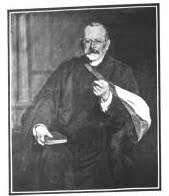Louis Barnett Abrahams
Louis Barnett Abrahams (3 October 1839 – 3 June 1918) was a British educator, the headmaster of the Jews' Free School in London.
Louis Barnett Abrahams | |
|---|---|
 Portrait of Louis Barnett Abrahams by Solomon J. Solomon, 1908 | |
| Born | 3 October 1839 |
| Died | 3 June 1918 (aged 78) |
| Nationality | British |
| Occupation | Educator |
| Years active | 1869–1907 |
| Known for | Headmaster of the Jews' Free School in London |
Notable work | A Translation of the Prayer-Book for School Use (1908) |
Abrahams was prominent, and articles about him appeared regularly in mainstream British Jewish publications in his lifetime, including The Jewish Chronicle, The Jewish Encyclopedia, the Jewish Yearbook (UK - 1899), and the Young Israel (December 1899).[2]
Education and teaching
Abrahams began his studies at the Manchester Hebrew School, but left there to go to London, where he lived with his uncle, Rabbi Aaron Levy, a sofer and dayan (judge) on the London Beth Din.[3][4][5] He became a student-teacher at the Jews' Free School on 1 June 1854,[4][6][7] and then entered the University of London, completing a bachelor's of arts degree in 1863.[3][5]
He became a teacher at the Jews' Free School, and became head of the English department in 1864. While continuing to teach there, he also studied at John Curwen's Tonic Sol-Fa College, graduating in 1874 and adding music to the subjects he taught at the Jews' Free School. He became a school administrator in 1884 and headmaster in 1897, succeeding Moses Angel.[3]
As Moses Angel did before him, Abrahams disliked the Yiddish spoken by Jews newly arrived to England in a wave of immigration from Russia. In a 1905 speech at a prize-giving ceremony, he called Yiddish "that miserable jargon which was not a language at all". Instead, he favored immersion in English as a way of quickly assimilating Yiddish-speaking students.[3][7][8] Along with the introduction of music to the curriculum, he founded a cadet corps at the school, built a gymnasium, and organized sporting activities for the students.[3] He also moved the school away from purely theoretical studies and towards technical and vocational training, by opening new physics and chemistry laboratories and woodworking and metalworking shops.[9][10] Under his leadership the school became "the largest public elementary school in the world".[11][12][9] He retired from the school in 1907.[3][9]
Other activities
Abrahams founded a periodical, the Jewish Record, in 1868, and served as its first editor for three years.[3][4][5][11] He also helped found the Jewish Educational Board and the Teachers' Training Committee,[6] and worked with several local benevolent societies. After retiring, he became honorary president of the synagogue at Westcliff-on-Sea.[3]
A portrait of Abrahams by Solomon Joseph Solomon was a part of an exhibition at the Burlington House in the Royal Academy of Arts in 1908.[13]
Personal
Abrahams was born on 3 October 1839 in Swansea.[3][4][14] His father, Barnett Abrahams (1785–1868), taught Hebrew there,[4] and became cantor in Manchester in 1845. His mother, Hannah, was Barnett's second wife, came from a Polish family, and died in 1868. Abrahams married Fannie Rosetta Mosely on 11 February 1869; they had two children.[3] His son, Bertram Louis Abrahams (1870–1908) was a physician, a member of the Royal College of Surgeons, and a Fellow of the Royal College of Physicians.[15] He died on 3 June 1918.[3]
Publications
Abrahams was the author of:[4][6]
- Murby's Chronological History of England (1870)
- A manual of Scriptural History for Jewish Schools and Families (1882)
- A Translation of the Prayer-Book for School Use (1908)
His translation of the prayer-book was widely used in Jewish schools throughout England.[4]
A sonnet by Abrahams was included in The Standard Book of Jewish Verse.[16]
References
- Mr. L. B. ABRAHAMS. (obituary), The Times, 7 June 1918, p. 23. Accessed September 23, 2016 - via Newspapers.com

- "ABRAHAMS, LOUIS BARNETT - JewishEncyclopedia.com". www.jewishencyclopedia.com. Retrieved 24 April 2017.

- Berger, Doreen (2004). "Abrahams, Louis Barnett (1839–1918)". Oxford Dictionary of National Biography. Oxford University Press.
- Rubinstein, W.; Jolles, Michael, eds. (2011). The Palgrave dictionary of Anglo-Jewish history. Basingstoke: Palgrave Macmillan. ISBN 9780230304666.
- "Jews' Free School - The New Headmaster". The Jewish Chronicle. 10 December 1897. Retrieved 24 April 2017.
-

- Black, Gerry (1998). JFS : the history of the Jews' Free School, London since 1732. London: Tymsder Publishing. pp. 126, 137–138. ISBN 978-0953110407.
- Alderman, Geoffrey (1998). Modern British Jewry. Clarendon Press. p. 139. ISBN 9780198207597.
- "The Largest of our Elementary Schools: Where Russian Jews are Made Into Good British Subjects". The Sphere. 32. 1 February 1908. p. Suppl. i.
- "A revolution at the free school". Israel: the Jewish Magazine. Vol. 3. 1900. pp. 194–196.
- "Louis Barnett Abrahams (obituary)". The Annual Register. Vol. 160. 1919. p. 180. Retrieved 22 September 2016.
- Phillips, Olga Somech (1957). "The Early Days of the Jews' Free School: A Short Survey". Jewish Quarterly. 5 (2): 41. doi:10.1080/0449010X.1957.10704104# (inactive 22 January 2020).
the biggest school in the world-consisting of 5,000 children ... over four decades ago [from 1957]
- F. C. Tilney, Portraits at the Royal Academy, British Journal of Photography, vol. 55, May 8, 1908, pp. 359-360. Accessed September 23, 2016
- However, the Jewish Encyclopedia lists his birth year as 1842, and the Jewish Chronicle as 1840.
- "Details for Bertram Louis Abrahams". Munk's Roll. Retrieved 23 September 2016.
- Abrahams, Louis B. (1917). "To Walter Lionel de Rothschild on His Bar-Mitzvah". In Friedlander, Joseph (ed.). The Standard Book of Jewish Verse.